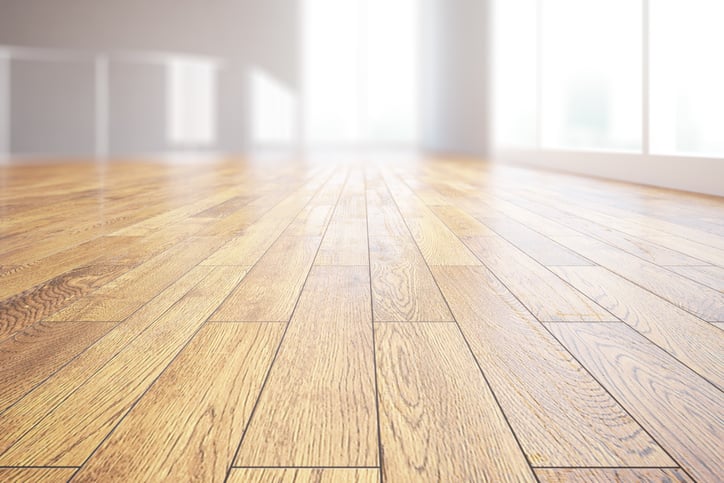5 Tips to Care for Your Floors

You may spend a lot of time thinking about how to keep your home tidy and up-to-date, but how often do you look down at your floors? Flooring is one of the biggest factors on overall feel of a space.
It may be tempting to opt for cheaper flooring materials and methods in intermediary areas, but putting in a little extra time and effort can increase a property’s rental and resale value—and make its occupiers proud to call it their home.
Here are 5 tips to ensure your flooring looks stunning from the ground up.
1. Put in the Ground Work: Subfloor Prep Is Key
As with everything in life, a good foundation is key. Before the carpet is laid, ensure all the floorboards are screwed tightly to eliminate creaks and squeaks. Fill in all holes which might let high heels slip through and puncture the carpet. Working on rough concrete? Level the floor with a suitable levelling compound. As for smoother concrete, a good underlay will cover any minor imperfections.
With laminate or wood flooring, it’s vitally important the subfloor is level—if it’s a floating laminate or engineered floor across a bumpy subfloor, there will be a lot of bounciness! Once level, be sure to use a decent quality underlay with a moisture barrier to inhibit any potential dampness from seeping into the flooring. Fit the floor before you install the skirting—this will let you hide the expansion gap with the skirting board and avoid having to use beading trim. This will give a really crisp finish.
When preparing chipboard floors, always ply-line the floor with a solid 6mm-thick plywood. However high quality it may be, all chipboard can shrink. Ply lining will stabilize the floor perfectly. Once the ply is securely fixed, apply a feather finish and scratch-coat the floor with a trowel. This will fill in all the minor holes where the nail heads have fired through the ply, while also filling in any hairline joins.
Coming back to concrete floors: Depending on the type of levelling compound used, it may also be necessary to prime the floor with a primer. There are certain levelers that dry so hard their tensile strength has a grabbing effect on the subfloor. If not properly bonded with a primer, the compound can dome up and pop off the floor. This can result in lumps, which will result in the new floor being ruined. Always read the instructions on the sub-floor levelling products and don’t cut corners.
2. Make an Entrance: Mats Matter
While hardly glamorous, entrance matting is not to be forgotten or skimped on if the property is to be well kept. Here is a more modern mat.
Coconut matting was popular for a while, but because it’s very thick and it can lead to the need for doors to be trimmed to accommodate it, which is a lot of trouble to go to for something as boring as a doormat. It also sheds thick hairs, which end up getting trampled throughout the property.
Dark brown or anthracite ribbed matting makes a great alternative. This stuff comes in a 2m-wide roll, so make sure enough is ordered to cover your hall from one end to the other. Fit it as far into your hallway as possible and it’ll grab more dirt, and also reduce the amount of actual flooring needed.
3. Take Your Stairs to the Next Level
This is where the real fun begins! The true measure of any house is in the care taken with its least interesting spaces. Stairs and halls must look nothing less than beautiful. Prep all hallway floors, and for the primary flooring material, fit some wood-effect luxury vinyl tiles, and go one step further by framing all the areas with a border.
Fit staircases with a decent-quality carpet on a tough underlay, like Cloud 9 Contract. This will minimize noise and provide cushioning underfoot, which instantly improves the standard of the home. A spongy underlay can cause carpets to go saggy on the stairs over time.
4. Bathrooms and Kitchens: The Vinyl Solution
Kitchens and bathrooms always take a beating—particularly in shared houses—so poor flooring choices in these areas can look ragged and tired within a year. Ceramics may be a longer lasting solution, but they often take damage—accidents happen, and a chipped or cracked floor can become a problem to repair.
Laminates and wooden floors are simply not worth the risk in wet areas. As laminate is made from a high-density fiber board (HDF) core, water will find its way into any cracks, causing your boards to swell up. Luxury vinyl flooring is an alternative.
5. Bedrooms
The obvious choice for any bedroom is a nice soft carpet for maximum warmth and comfort; however, its installation needn’t be overthought. For smooth subfloors, a felt-backed carpet can provide a low-cost solution. They’re inexpensive, quick to fit, don’t require a gripper or underlay, and are easy to switch if a new color is required.
To maintain the tough flooring theme running into the bedrooms, go for a laminate, a wood, or—again—a luxury vinyl tile. This hard-wearing flooring option will retain its fresh look for years.
While luxury vinyl tile might cost double what a laminate or carpet may cost, it will last five times longer and bring in loads of benefits—especially if you’re doing up a rental property. You can expect to increase your capital growth, your rent, your rental security, and, most importantly, easier sleep knowing you’ve built yourself a beautiful property that are a cut above the rest.


